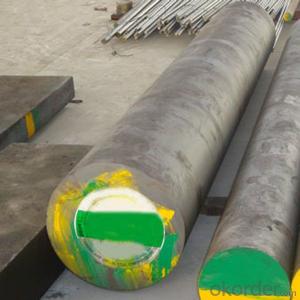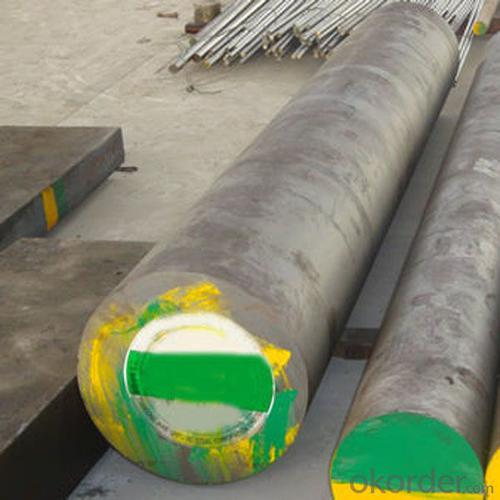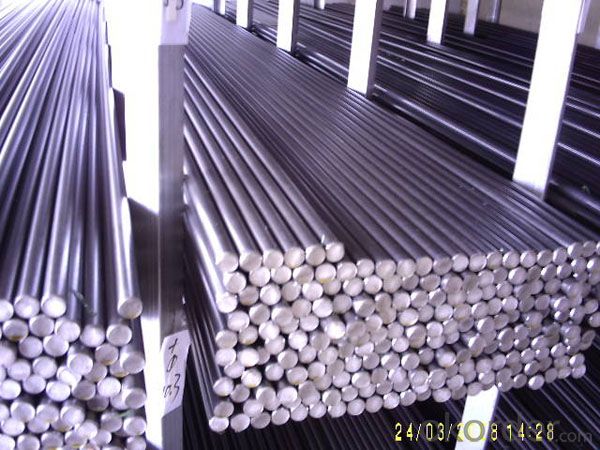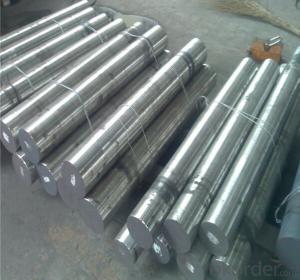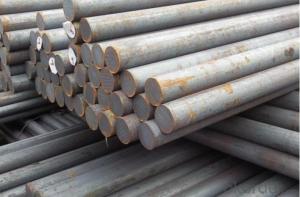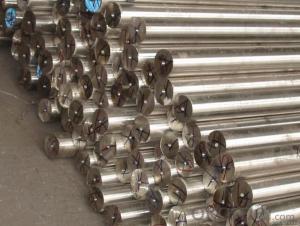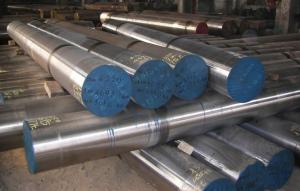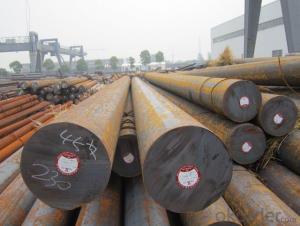Special Steel W6 High Speed Tool Steel Round Bar
- Loading Port:
- China main port
- Payment Terms:
- TT or LC
- Min Order Qty:
- 25 m.t.
- Supply Capability:
- 10000 m.t./month
OKorder Service Pledge
OKorder Financial Service
You Might Also Like
Specification
The details of our Steel
1. Produce Standard: as the GB, AISI, ASTM, SAE, EN, BS, DIN, JIS Industry Standard
2. Produce processes: Smelt Iron -EAF smelt Billet - ESR smelt Billet -Hot rolled or forged get the steel round bar and plate
3. Heat treatment:
Normalized / Annealed / Quenched+Tempered
4. Quality assurance:
All order we can received Third party inspection, You can let SGS, BV,.. and others test company test and inspect our products before Goods shipping.
Product information
Chemical Composition(GB)%
| Standard | C | Si | Mn | P | S | Cr | W | Mo | V |
| W6Mo5Cr4V2 | 0.55-0.65 | ≤0.40 | ≤0.60 | ≤0.030 | ≤0.020 | 3.70-4.30 | 6.00-7.00 | 4.50-5.50 | 1.70-1.10 |
| M2 | 0.78-0.88 | 0.20-0.45 | 0.15-0.40 | ≤0.030 | ≤0.030 | 3.75-4.50 | 5.50-6.75 | 4.50-5.50 | 1.75-2.20 |
Heat Treatment
| Item | Temperature℃ | Hardness |
| Anneal | 840-860 | ≤255HB |
| Quenching | 1150-1180 | ≥60HRC |
| Tempering | 560-580 | ≥60HRC |
Applications:Used for various tools,large thermoplastic forming cutting tools,abrasion resistance components operating under high load such as cold extrusion dies
Product show

Workshop show

- Q: What is the impact of grain size on the mechanical properties of special steel?
- The mechanical properties of special steel are significantly affected by the size of its grains. Grain size refers to the dimensions and arrangement of individual crystals within the steel structure. It is determined by various factors, including the speed at which the steel solidifies and subsequent heat treatments. In general, smaller grain sizes in special steel result in improved mechanical properties. This is because smaller grains provide more grain boundaries, which act as obstacles to the movement of dislocations and enhance the steel's strength. Smaller grains also contribute to a more uniform microstructure, enhancing overall toughness and resistance to fracture. Furthermore, smaller grain sizes promote higher hardness and increased resistance to wear in special steel. This is because the greater number of grain boundaries impedes dislocation movement, preventing plastic deformation and resulting in higher hardness values. Conversely, larger grain sizes can have a detrimental effect on the mechanical properties of special steel. Larger grains have fewer grain boundaries, allowing dislocations to move more freely. As a result, the strength, toughness, and hardness of the steel are diminished. Additionally, larger grains can lead to anisotropic behavior, where the mechanical properties vary in different crystallographic directions. This makes the steel more vulnerable to failure under specific loading conditions. Therefore, it is crucial to control and optimize the grain size in special steel to achieve the desired mechanical properties. This can be accomplished through precise heat treatments, such as annealing or quenching, which regulate the cooling rate and subsequent recrystallization processes. By controlling the grain size, special steel can be tailored to meet specific application requirements, ensuring optimal mechanical performance and reliability.
- Q: What are the different types of high-speed steel?
- There are several different types of high-speed steel, including M1, M2, M42, and T1. Each type has its own unique composition and properties, making them suitable for various applications in cutting tools, drills, and machining operations.
- Q: What are the requirements for special steel used in high-performance racing cars?
- The requirements for special steel used in high-performance racing cars include high strength and durability, excellent fatigue resistance, good thermal conductivity, and the ability to withstand high temperatures and extreme conditions. Additionally, it should have low weight and high stiffness to enhance the car's performance and maintain its structural integrity under intense stress and vibration.
- Q: What are the main factors affecting the impact toughness of special steel?
- The impact toughness of special steel, or any material for that matter, is influenced by various factors. Some of the main factors affecting the impact toughness of special steel are: 1. Composition: The chemical composition of the steel plays a significant role in determining its impact toughness. Elements such as carbon, manganese, silicon, nickel, and molybdenum can be added to enhance the toughness of the steel. Higher carbon content generally improves hardness but reduces toughness, while alloying elements like nickel and molybdenum can enhance toughness. 2. Heat treatment: The heat treatment process, including processes like quenching and tempering, can significantly affect the impact toughness of special steel. Proper heat treatment can refine the microstructure of the steel, making it more resistant to fractures and increasing its toughness. 3. Microstructure: The microstructure of the steel, including the size, shape, and distribution of its grains, greatly impacts its toughness. Fine-grained steels generally exhibit better toughness compared to coarse-grained ones. The presence of certain phases, such as martensite or bainite, can also affect the impact toughness. 4. Inclusions: The presence of non-metallic inclusions, such as sulfides, oxides, or carbides, in the steel can act as stress concentration points and reduce its impact toughness. High-quality special steels often undergo processes like vacuum degassing or electroslag remelting to minimize the presence of these inclusions. 5. Processing conditions: The manufacturing processes used to produce special steel can influence its impact toughness. Factors such as forging, rolling, or extrusion conditions, as well as the cooling rate during solidification, can affect the microstructure and, consequently, the toughness of the steel. 6. Temperature: The impact toughness of special steel also varies with temperature. Some steels exhibit good toughness at low temperatures, while others may have better performance at higher temperatures. The temperature at which the steel is used or tested is an important factor to consider when evaluating its impact toughness. It is worth noting that the impact toughness of special steel is often determined using standardized tests, such as the Charpy or Izod test, which involve subjecting a notched specimen to impact loading. These tests provide valuable information on the material's ability to absorb energy and resist fracture under impact conditions.
- Q: What are the different methods of preventing stress relaxation in special steel?
- Preventing stress relaxation in special steel can be achieved through various methods. One effective approach is the utilization of heat treatment, specifically by employing the annealing process. Annealing consists of heating the steel to a specific temperature and gradually cooling it down. This technique successfully alleviates internal stresses within the steel, thus preventing stress relaxation. Another effective method involves employing stress relieving techniques. These techniques necessitate the controlled application of stress to the steel, typically through cold working or mechanical deformation. By doing so, the steel can effectively release any accumulated stress and avoid relaxation over time. Furthermore, incorporating alloying elements into the steel can also aid in preventing stress relaxation. Certain alloying elements, such as molybdenum and chromium, enhance the steel's strength and stability, thereby improving its resistance to stress relaxation. Lastly, meticulous design and engineering of components also contribute to the prevention of stress relaxation. Engineers can minimize the risk of stress relaxation in special steel applications by considering factors such as load distribution, material thickness, and stress concentration points. In conclusion, a combination of heat treatment, stress relieving techniques, alloying elements, and thoughtful design can be employed to effectively prevent stress relaxation in special steel.
- Q: What are the different inspection methods used for special steel?
- There are several inspection methods used for special steel, including visual inspection, magnetic particle inspection, ultrasonic inspection, and dye penetrant inspection. Visual inspection involves examining the steel for any surface defects or irregularities. Magnetic particle inspection uses magnetic fields and iron particles to detect any cracks or defects in the steel. Ultrasonic inspection involves sending high-frequency sound waves through the steel to identify any internal flaws or defects. Dye penetrant inspection involves applying a colored liquid to the steel's surface, which seeps into any cracks or defects, revealing their presence. These methods help ensure the quality and integrity of special steel products.
- Q: How does special steel perform in cryogenic conditions?
- Special steel performs well in cryogenic conditions. Its low temperature resistance allows it to maintain its strength, toughness, and ductility even at extremely cold temperatures. This makes it suitable for various applications in cryogenic industries, such as liquefied natural gas (LNG) storage tanks, aerospace components, and medical equipment. Additionally, special steel's resistance to brittleness and corrosion ensures its reliability and durability in these challenging environments.
- Q: How does special steel contribute to the manufacturing of power generation equipment?
- Special steel plays a crucial role in the manufacturing of power generation equipment due to its unique properties and characteristics. Its exceptional strength, durability, and resistance to corrosion and high temperatures make it an ideal material for various components used in power plants, including turbines, boilers, and generators. Special steel's ability to withstand extreme conditions ensures the reliability and efficiency of power generation equipment, contributing to the overall performance and longevity of power plants.
- Q: How does special steel contribute to improving product functionality?
- Special steel contributes to improving product functionality in several ways. Firstly, special steel offers enhanced strength and durability, allowing products to withstand higher loads and perform under extreme conditions. It also provides superior resistance to corrosion, which extends the lifespan of products and reduces maintenance costs. Additionally, special steel can be tailored to specific applications, such as high-temperature environments or magnetic properties, further enhancing product functionality. Overall, the use of special steel results in more reliable and efficient products, ultimately benefiting consumers and industries alike.
- Q: How does special steel resist fatigue?
- The durability and strength of special steel are enhanced through the incorporation of specific properties that resist fatigue. The high tensile strength of this steel is a primary factor in its ability to withstand stress and load without deforming or breaking, preventing the initiation and spread of fatigue cracks. In addition, special steel often undergoes heat treatment processes like quenching and tempering to further enhance its fatigue resistance. This alters the steel's microstructure, creating a fine and uniform grain structure that improves its mechanical properties. It increases hardness and toughness, reducing susceptibility to fatigue failure. Furthermore, special steel can be alloyed with elements like chromium, molybdenum, and vanadium to enhance its resistance to fatigue. These elements form carbides and other strengthening phases within the steel, improving hardness, strength, and resistance to fatigue crack propagation. Moreover, specialized surface treatments like shot peening and nitriding can be applied to special steel. Shot peening involves bombarding the steel surface with small metal particles, inducing compressive residual stresses. These stresses counteract the tensile stresses that cause fatigue cracks, thus enhancing fatigue resistance. Nitriding involves diffusing nitrogen into the steel surface, creating a hardened layer that improves wear resistance and, consequently, fatigue resistance. In conclusion, special steel resists fatigue through a combination of factors, including high tensile strength, specific heat treatment processes, alloying elements, and specialized surface treatments. These properties work together to enhance the steel's durability, strength, and resistance to fatigue crack initiation and propagation, making it a reliable and long-lasting material for various applications.
Send your message to us
Special Steel W6 High Speed Tool Steel Round Bar
- Loading Port:
- China main port
- Payment Terms:
- TT or LC
- Min Order Qty:
- 25 m.t.
- Supply Capability:
- 10000 m.t./month
OKorder Service Pledge
OKorder Financial Service
Similar products
Hot products
Hot Searches
Related keywords
